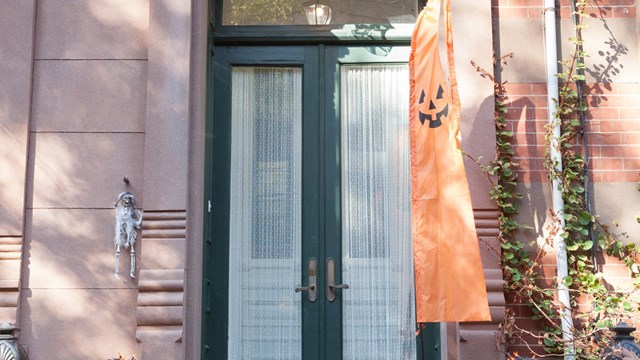There is nothing more uncomfortable during a harsh Mid-Atlantic winter than having windows that are inoperable or that are so cracked, damaged and poorly sealed that the cold air just streams in unabated.
Drafty windows mean energy wasted and money burned–so how does an individual homeowner or homeowners association (HOA) board determine whether their windows need to be completely replaced or just refurbished?
Some of the telltale signs that it may be time to install new windows, according to Window City of Clifton, include constant thermostat control adjustments to account for the indoor temperature; peeling, cracking or visibly damaged window frames that require extra painting each year; appearance of condensation or water damage around the window frames; or inoperable hardware or sashes.
Who's In Charge
A window repair or replacement project is certainly a huge undertaking but the question of where the jurisdiction lies to pay for that capital improvement is a tricky one, according to Rick Christenson, a vice president with Frost Christenson & Associates, an engineering consulting firm located in Bound Brook.
In a typical condominium association, the unit owner usually is responsible for the space contained within the exterior walls of the structure and they also share an interest in maintaining various common elements as well. Common property maintained by an HOA usually are things such as pools, greenways and private roads and in the case of condominiums, usually building structure, walls, roofs, plumbing, wiring and other aspects of the building. Property owners typically pay monthly assessments that enable the HOA to operate the association and maintain the common property.
This differs somewhat from a cooperative, where the building, land and obligation for any capital improvements typically fall under the purview of the co-op corporation rather than an individual shareholder. However, shareholders are responsible for paying monthly maintenance fees to account for building and grounds upkeep and any capital improvement projects that may be ongoing.
In a condominium community or HOA, responsibility for windows can vary depending on a number of outlying factors, according to Christenson. "In most cases, responsibility goes to the individual homeowners and it is not an association responsibility. On the other hand, there are some associations where the windows are covered," says Christenson. He notes that sometimes maintenance and repair of windows will be included in an association's governing documents, such as the bylaws or the declaration of covenants, conditions and restrictions (CC&R).
The Underlying Cause
In some cases, adds Christenson, an owner may cede responsibility for window replacement and repair to the association. "Sometimes the problems don't necessarily relate to the windows themselves," he says, pointing out that the structure itself might be sound but the area around the windows damaged. "There could be a chronic water leak through the wall or flashing deficiencies around the window." In order to determine jurisdiction for the repair, you have to find the origin behind the problem or the underlying cause, he explains.
Look Before You Call
Not all window problems warrant major repair. If heat was leaking out of your building this winter, the culprit may have been eroded weather stripping and seals on your windowpanes. When the window casings and frames themselves are in good condition, a contractor can take some routine measures to reseal your windows against the cold and restore their sashes, panes, and frames to "like-new" condition. Indications that a window is in need of preventive care are not always glaringly obvious, so act in a timely fashion.
The Basics of Window Maintenance
John Zoetjes, who owns New Jersey Window Erectors in Sparta, recommends homeowners follow some basic maintenance tips, such as inspecting the weather-stripping on an annual basis and repairing or replacing it if necessary. "Look for cracks, rot, or spaces in the weather-stripping that would allow air or water to come through," he says. If the state of your windows is a little dubious, though not to the point of complete replacement, it may be possible to make them more fuel-efficient by adding exterior or interior storm windows. Usually, these can be installed without any major alteration of the window frame or sill. Modern storm windows are thermally efficient, cost-effective, reversible, and allow you to keep your original windows intact.
Some problems, however, are beyond the ability of even the most skilled, resourceful do-it-yourselfer. At that point, it's time to call in professional help.
Calling in the Window Doctor
It can sometimes be difficult for the untrained eye to tell whether drafty, rattling windows need to be refurbished, or replaced entirely, so most window contractors offer consultations to determine just that. Generally, a window contractor will send someone in to survey the building and size up what's necessary, whether it be for a townhouse community, or a high-rise co-op or condo. The contractor will then recommend a course of action to improve the building's appearance and fuel efficiency, and restore the comfort of its residents.
Michael Fishman, president of Historic Window Resources in Plainview, New York recommends an initial consultation, followed by an extensive survey of the property in question. "We examine every window in the building," says Fishman. "We assess its size, its type, and what's wrong with it. Surveying each individual window gives us the opportunity for an accurate assessment."
Basically, it all depends on what you've got and what shape it's in. Do-it-yourself repairs might save you money on materials and labor, but done improperly, even a simple project can cost you dearly in damage control down the road. A reputable window consultant-contractor will recommend the most prudent course of action after examining your property. "Any building needs a master plan," says Fishman. "You need to determine the building's needs, understand its history, and come up with an intelligent, economical plan. What you don't want is a patchwork approach."
What is Management's Role
Regardless of who is responsible for the repair, managing agents do have an important role in overseeing that the project goes smoothly, according to Stan Rothenberg, the executive vice president and chief operating officer of C&R Realty and Management Co. in Englewood Cliffs. "In a condo or a co-op, if the board decides that the windows are inefficient and have to be replaced, the managing agent's role is to put everything together from start to finish."
It sometimes can be a nightmarish tedious undertaking, he confesses, as the manager has to monitor the bidding process, evaluate and recommend engineers and contractors, look at samples of work and obtain references, disseminate information to residents, and forward all that information to the board or association for approval.
When a condo owner is responsible for the replacement, the managing agent still must oversee the installation to ensure that the project is done to the association's specifications. "If you have anodized bronze screens in there, you have to make sure they don't put up blue ones," Rothenberg says.
Doug Weinstein, a regional director for Wentworth Property Management in Hackensack, agrees that a manager's role is vital. In a full-blown total window replacement project, a managing agent serves as sort of a project manager. They must coordinate everything that happens on the site, attend job meetings, deploy personnel, get all the approvals and contracts signed, notify and inform the unit owners and act as a liaison with the board or the association.
When the unit owner is involved, the managing agent will check that the proposed window conforms to all the aesthetics and guidelines set forth by the association. The manager must also be aware that the hired contractor is fully insured and that his or her methods are in keeping with recommended practices for the building, according to Weinstein. Everything funnels through the managing agent, and say, you have 4,000 to 5,000 windows to be installed—it is a major project that needs careful oversight, he says.
Sometimes, he adds, the association will have in its bylaws or governing documents—specific building standards that will spell out which contractor or what type of window the unit owner can use. In other instances, the association will step in and install the window and "back charge the unit owner" in order to make sure that the project is in keeping with the building standards and aesthetics, says Weinstein. He adds that he has also been involved in projects, where unit owner participation is voluntary, and in that instance the managing agent has to track whose windows are being replaced. There are a great many different scenarios that a managing agent has to keep tabs on in any capital improvement project, Weinstein says.
If the unit owner is personally responsible for doing the window repair or replacement and hires the contractor, there are some basic things to check for. Every contractor must have liability and worker's compensation insurance. Most professionals suggest that you find a reputable window contractor through referral, and check out examples of their past work. Neighbors, supers, window supply vendors, and other contractors you've worked with in the past and have a good relationship with are good sources for this information.
As you try to decide on which company to go with, consider the following questions. Has the contractor previously worked in your building, or in a similar building? Do they have a specialty in installing the type of windows that you need? Does the company use a subcontractor? Is their insurance up to date? Are they licensed to work in New Jersey?
For larger window projects, Zoetjes even recommends asking for a sample window to be installed. "It will demonstrate the installation method and the overall quality of the window for that particular project," he says. "This window in essence becomes the standard for every other window that needs to be installed on the property."
When the Pane is Serious
Window replacement can be expensive; so you can expect to dig deep into your building's or association's coffers to fund the project and to have your chosen contractor's work crews entering the property for several weeks before all is said and done. Speaking very generally, a 120-unit building with four or five windows per unit to replace will take about six weeks to complete at a cost of around $1,400 to $1,500 per unit for a standard rip-out and replacement job. While that figure can vary one way or the other depending on materials and unique structural issues, that gives you an idea of the dollars involved.
Time and cost increase exponentially in larger buildings. Says Fishman, "On a big building, the initial consultation takes about a week. The survey takes several weeks, you've got a week for shop drawings, then eight to 10 for fabrication. Once the installation gets underway, we can do about 50 windows a week." While the pricetag may make you gasp, this is hardly the time to cut corners, according to Fishman. "If a building spends $500,000 on their windows when they should have spent a million, they've wasted their money."
New Cool Stuff
Whether you're considering vinyl or aluminum, double-hung, tilt-and-turn, sliders, casement or fixed, double or single-pane, or windows with Low E Argon gas for energy efficiency, a variety of new technologies are available in the window replacement industry today. There are some interesting features to spend that $500,000 or $1 million on.
"Many [companies] are improving on the standard, or traditional windows," says Craig Berlin, president of Chute Master Indoor Environmental Services, Inc. in Union.
For example, 3M—the company that brought the world Post-It stickies and Scotch Tape—has developed a line of tough, transparent polyester films that, when applied in multiple, "microthin" layers to windows, will hold shattered glazing together in the event of a break and prevent injury. Film-coated glass can be purchased ready-made, or applied to pre-existing windows.
The right kind of film treatment can cut a building's heating and cooling costs, too. "There's always a side of a building that catches the sun—a hot side and a cold side," says Berlin. "You can apply a film to the problem areas and help balance out the building."
Berlin says that installing special films on existing windows is a relatively simple matter. An authorized installation expert applies a chemical treatment containing UV blocker and other climate-control properties to the exterior of the window, and then applies the microthin film like wallpaper. The upshot is not only improved insulation, decreased UV exposure, and increased safety: buildings opting to apply safety tints to their windows may even qualify for better insurance premiums and incentives for making their building safer and more energy-efficient.
Zoetjes, for his part, recommends exercising caution. He says that it's important to be wise in considering which new products on the market are worth the investment. "Argon gas has been touted as the new buzzword in the window industry, and it's something I don't feel has had enough of a proven track record to be considered as a long-term high-performance product," he says.
Argon gas is put between the two panels of glass to act as an insulating barrier. Zoetjes says that the gas can leak out of the window, undetected, so you can't tell if it's still there, providing the desired benefits. "Something you've paid substantially for may not even be there years down the road," he says.
Paying the Bill
If a $500,000 price quote and seeping Argon gas aren't enough, consider that total window replacement projects don't just pop up out of nowhere. True, a broken pane or bout of water damage may arise from time to time, but if your association has been staying on top of its reserve studies—and getting regularly assessed by a certified engineer—you'll know how much life your windows have left in them long before the icy fingers of winter start to pry their way into your home. Major window repair and/or replacement projects are considered capital improvements, and as such are usually funded from an association's capital reserve fund. As long as the reserve studies are thorough and the reserve fund itself is robust, your building should be well prepared for a window replacement long in advance of the project's commencement.
"I recommend getting a second or third quote," says Zoetjes. "And always be sure that each quote spells out, item-for-item, exactly what you're getting." This list should include the type of window, the material used, the specific rating for the window (e.g. commercial or non-commercial), and the thickness of the insulating glass.
In the Long Run
Though the initial cash outlay for window work can seem daunting at first, it's important to remember what your windows do for your building. More than just plates of glass and pieces of wood, they let in all-important light and air and serve as vantage points on the outside world. Whether your windows just need a little TLC or are ready to be put out to pasture you can expect to spend a lot less in heating costs and a lot less time cursing the cold next winter once the job is done and done properly.
Michael McDonough is a freelance writer and frequent contributor to The New Jersey Cooperator.







5 Comments
Leave a Comment